United Kingdom Withdrawal From the European Union / Brexit
Overview
United Kingdom Withdrawal From the European Union, colloquially known as Brexit (short for "British Exit"), refers to the withdrawal of the United Kingdom (UK) from the European Union (EU), a regional political-economic union that the country has been a member of since joining its precursor organization, European Economic Community (EEC), in 1973. While the UK's membership status within the EU has been a long-standing topic of debate in the country for decades, the public interest surrounding the issue saw an unprecedented resurgence during the months leading up to its EU referendum in June 2016. The referendum ended with 51,9% of the voters voting to leave the European Union.
Background
Following the end of World War II in 1945, many European countries called for a closer political and economic integration at the regional level. During the early years of the discussions, the United Kingdom played a vital role in paving the road for several regional organizations in Europe, beginning with the Treaty of London in 1949 which established the Council of Europe, followed by the admission into the European Economic Community (EEC), the official predecessor to the EU, alongside Denmark and Ireland in 1973. Two years after joining the EEC, the UK held a referendum to decide whether the country should remain in the organization, which resulted in a 67% approval of continued membership.
1975 EEC Referendum
On June 5th, 1975, the UK held a referendum on whether it should remain in the EEC. With nearly all major political parties in favor of remaining in the EEC, except for an anti-European faction within the ruling Labour party, the referendum resulted in the continuation of the UK membership by an overwhelming majority.
Euroscepticism in the UK
Over the following decades, Euroscepticism gained significant traction in the UK under the leadership of the Conservative Party and renowned British prime minister Margaret Thatcher, who had supported the UK's EEC membership in the 1975 referendum but vocally opposed the concept of European integration at large. In 1991, the growing sentiment of Euroscepticism led to the foundation of the Anti-Federalist League, a minor cross-party coalition against the UK's involvement in European integration, which would later rename itself as the UK Independence Party (UKIP). In 1992, the UK signed the Maastricht Treaty, a pillar structure which effectively created the European Union and the single-currency zone, though it opted out of joining the Euro currency and social chapter in order to preserve its autonomy. September 16th, 1992, the date on which the UK decided to leave the British pound out of the proposed currency system, has since become known as "Black Wednesday." The UK's opt-out decision was later weakened with the signing of the Lisbon Treaty under Tony Blair's leadership in 1997, but Euroscepticism saw a resurgence during the early 2010s following the rise of the Conservative Party's David Cameron to power.
Notable Developments
Proposal of 2016 EU Referendum
After the Conservative Party's victory in the 2010 general election, UK Prime Minister David Cameron formally announced his support for a referendum on the nation's EU membership since as early as in 2013, following through with the pledge he had frequently made during his campaign. Following his re-election to the office in 2015, Cameron re-negotiated several aspects of the UK's membership in February 2016 and announced that the referendum, which will determine whether or not the United Kingdom will stay as a member or leave the EU completely, would be held on June 23rd, 2016.
Brexit
Brexit, a portmanteau of "Britain" and "Exit," refers to the hypothetical departure of the United Kingdom from the European Union. Stemming from the term "Grexit", which was introduced by Citigroup’s chief analysts Willem H. Buiter and Ebrahim Rahbari in February 2012 to describe a similar scenario in Greece that was gaining public support during the country's prolonged financial crisis, the earliest use of the word "Brexit" can be found in a tweet posted by British Influence, a UK think tank group that generally advocates Eurocentrism, on May 15th, 2012 (shown below).[17][18]

About a month later on June 21st, The Economist[19] ran an article titled "A Brixit looms," introducing the term to a larger audience.
The chances of Britain leaving the EU in the next few years are higher than they have ever been. A Brixit looms for several reasons.
Campaigns
There are two main political campaigns associated with the UK's upcoming referendum on the EU membership: Vote Leave[2], the official advocacy campaign in support of leaving the EU, and Britain Stronger in Europe[3], the official advocacy campaign in favor of remaining in the EU.
Brexit Supporters
The Vote Leave campaign is supported by several prominent figures within the Conservative Party, including Boris Johnson (Former Mayor of London) and Michael Gove (Lord Chancellor and Secretary of State for Justice), virtually all members of the UK Independence Party and a minor faction within the Labour Party known as "Labour Leave," as well as supporters of two other pro-Brexit campaigns, Grassroots Out and Leave.eu.[1] Other notable advocates of Brexit include actor Michael Caine[4], professional cricket player Ian Botham[4], former English football player Sol Campbell[6], as well as the British news outlets The Daily Mail and Daily Express.

Pro-EU Supporters
The "Britain Stronger" campaign is supported by several leading members of the Conservative Party, including David Cameron (Prime Minister), George Osborne (Chancellor of the Exchequer) and Theresa May (Home Secretary), as well as the leaders of the Labour Party, Liberal Democrats, Green Party of England and Wales and Scottish National Party (SNP). Other notable supporters include actor Emma Thompson[4], Top Gear host Jeremy Clarkson[4] and Stephen Hawking.[5]

Campaign Highlights
"Britain's Coming Home"
On February 22th, 2016, Mandy Boylett, a former candidate of UKIP in the 2015 general election, uploaded a video to YouTube featuring her appearing as two women, one with a blond wig, singing a pro-Brexit parody version of the song "Three Lions", the official anthem of the English football team. The video was highlighted by major news media outlets, such as Daily Mail[7] and the Huffington Post, which called it the worst song to come from British politics yet,[8] and Daily Express.[9] One of the singers of the original song, David Baddiel, said that while he and Frank Skinner, the other singer, did not give permission for the parody to be made, they might have done it due to it being "brilliantly naff".[10] As of May 2016, the song has over 575,000 views on Youtube.
Barack Obama's Speech
On April 24st, 2016, President of the United States Barack Obama held a press conference with David Cameron during his visit to the United Kingdom. Obama said during the conference, that if the UK were to leave the European Union, a trade deal with the US could take up to ten years to make.[40] Obama was afterwords criticised by the leave campaign for trying to intervene in another country's affair[41]. On April 28th, four days after Obama's press conference, a poll put leave ahead of the remain campaign.[42]
David Cameron's WWIII Statement
On May 9th, 2016, David Cameron, speaking to a crowd at the British Museum in London, claimed that leaving the EU may cause Europe to descend into war:
"Can we be so sure peace and stability on our continent are assured beyond any shadow of doubt? Is that a risk worth taking? I would never be so rash to make that assumption… What happens in our neighbourhood matters to Britain. That was true in 1914, 1940, 1989…. and it is true in 2016."
Cameron's remark was reported on by major news media such as the Telegraph[27], The Guardian[28], the Mirror[29] and the Daily Mail[30]. Boris Johnson quickly responded and said that "I think all this talk of World War Three and bubonic plague is totally demented frankly."[31]
Battle of the Thames
On June 15th, 2016, in an event organized by Fishing for Leave, UKIP Leader Nigel Farage, Conservative minister George Eustice and Labour MP Kate Hoey, led a pro-Leave flotilla up the River of Thames, with the boats filled with pro-Leave flags and banners. Later, pro-remain campaigner Bob Geldorf showed up alongside a pro-remain flotilla and tried to hijack the protest. The two flotillas then started "attacking" each other, spraying one another with water and the Remain side blasting the brexit side with music. The so-called "Battle of the Thames" was highly mocked on Twitter.[32]



Murder of Jo Cox
On June 16th, 2016, Jo Cox, member of the British Parliament for the Labour Party, was murdered in West Yorkshire as she was making her way to the local Library where she was supposed to speak. The attacker, armed with a knife and a gun, managed to stab and shot Jo Cox, before he was tackled by witnesses. The suspect of the attack, Thomas Mair, had been having a serious case of mental illness for several years, Mair's brother says.[33] Although some media claimed that the attacker had shouted "Britain first", the name of a far-right political party in the UK, when he attacked Jo Cox, some eyewitnesses deny that claim. One who supported the claim was found to be a member of the British National Party, which are known to be hostile towards Britain First.[34] The murder was widely condemned by British politicians from both side of the political spectrum. Prime Minister David Cameron called the attack "tragic and dreadful"[35], while Jeremy Corbyn, leader of the Labour Party called the attack an "attack on democracy".[36] Other countries, such as the Czech Republic[37], Canada[38] and Australia[39], also gave their condolences. In addition, UK Prime Minister David Cameron and Labour Leader Jeremy Corbyn showed up together to lay flowers as a tribute to Jo Cox. Other party leaders, such as UKIP Leader Nigel Farage, also showed up with flowers.


#CatsAgainstBrexit and #CatsForBrexit
On June 18th, 2016, Scottish internet law scholar Lilian Edwards[21] tweeted a photograph of her cat with the hashtag #CatsAgainstBrexit and an anti-Brexit message urging others in the camp to retweet the message with pictures of their own cats.

By June 20th, #CatsAgainstBrexit[22][24] and #CatsForBrexit[23][25] began making the rounds on UK's Twitter and Instagram as hundreds of British internet users made their final push in campaigning for and against Brexit with photographs of cats, including British conservative politician and member of the European Parliament (MEP) Daniel Hannan[26] who tweeted a pro-Brexit message using a photograph of Grumpy Cat (shown below, top left). Hannan's tweet garnered more than 1,200 retweets and 2,200 likes within the first 48 hours.









The Referendum
At 7:00 a.m. (BST, local time) on June 23rd, 2016, the EU membership referendum commenced at 41,000 polling stations across 382 local counting areas in all four countries of the United Kingdom (England, Scotland, Northern Ireland and Wales) and Gibraltar. The referendum ended at 10:00 p.m. (BST, local time)

#DogsAtPollingStations
On June 23rd, as the referendum went underway across Britain, many voters began sharing images of their dogs sitting outside the polling stations using the hashtag #DogsAtPollingStations, a photo fad that originally went viral on the day of the UK general election in May 2015.[45][46]
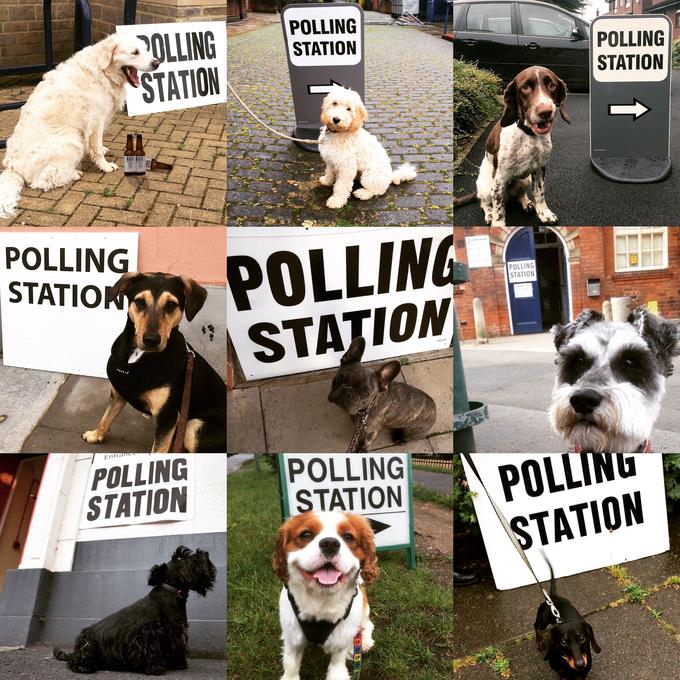
Tony Blair's "I Voted Remain" Sign
Also on June 23rd, former British prime minister Tony Blair reaffirmed his support for continued membership in the EU by sharing a picture of himself holding a sign that read "I Voted Remain" via his official Twitter account.[48] Within minutes of the tweet, some UK Twitter users responded to Blair's message with a handful of photoshopped parodies.
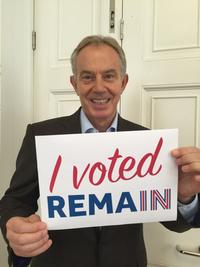



The Result
Throughout the day on June 23rd, more than 33 million voters participated in the referendum (or 71.8% of all registered voters in the UK), which marked the highest turnout for a national vote since the 1992 general election. By close to midnight on June 23rd, within two hours of the closure of the polling stations, several major British news outlets and international news agencies had begun reporting that votes calling for UK's exit from the EU were leading with 52% of total ballots counted. Ultimately, the referendum resulted in an overall decision to leave the European Union with 51.89% of the total votes.


Online Reactions
By the early morning on June 24th, virtually all the major social media platforms had become flooded with varying reactions to the announcement of the referendum results, which led several Brexit-related hashtags to trend globally on Twitter and Facebook.







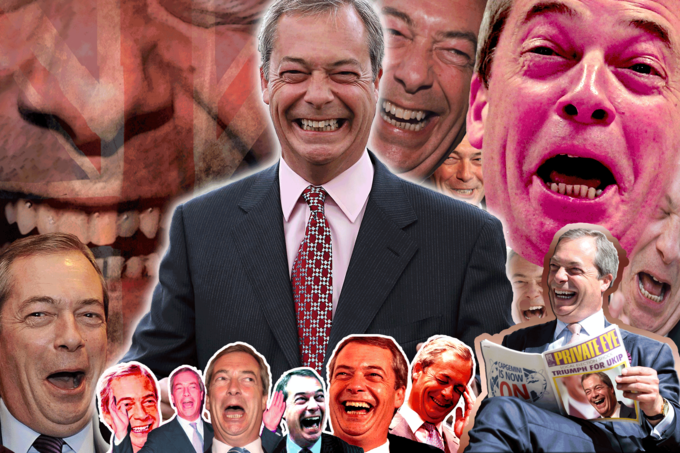



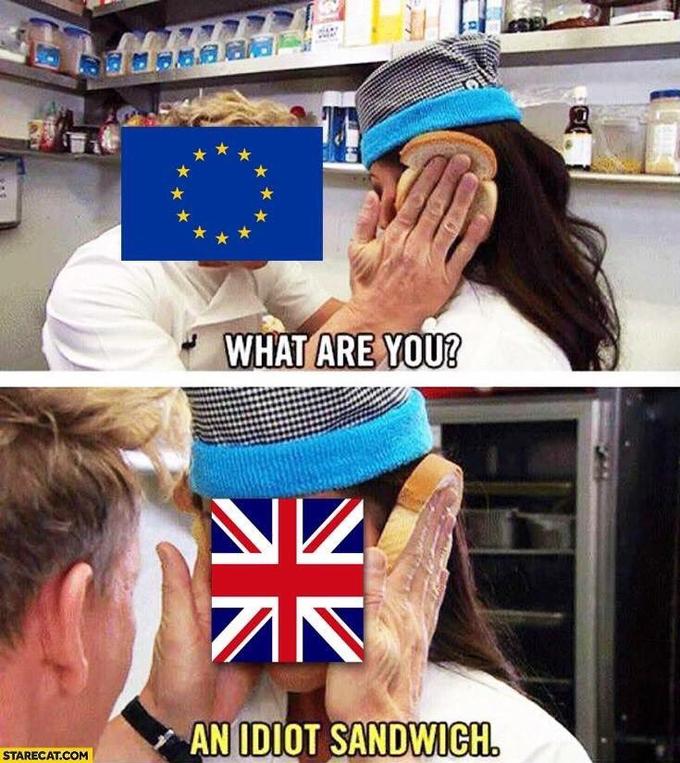





Meanwhile, Google Trends[52] provided a comprehensive report on search queries relating to the referendum. According to Google, "What is Brexit" was one of the most searched questions during the hours leading up to the day of the referendum and “What is the EU?” quickly became the second most searched term about the European Union in the UK following the announcement of the poll results on June 24th.[49]
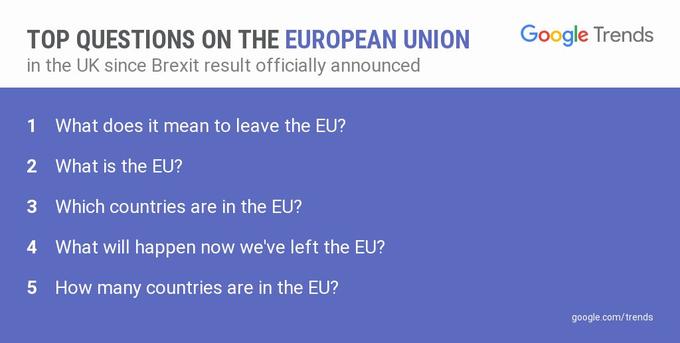
Online Petitions
Within hours of the announcement of the results, tens of thousands of British internet users in the Remain camp began flocking to online petitions calling for a second round of referendum on Britain's exit from the European Union, including one that had been started by William Oliver Healey, a pro-Brexit advocate and member of the English Democrats, a month before the referendum took place. By 10:40 p.m. on June 28th, Healey's petition had attracted more than four million signatures, about forty times the minimum threshold for any petition to be considered for debate in the Parliament. The sudden influx of petitioners, which reached a thousand signatures per minute at one point, eventually prompted the website to crash on several occasions.[56][57][58]
Impact
UKIP's Response
When it had become clear that the Leave side had a sizable lead over the Remain campaign, Nigel Farage made a speech, stating that the referendum "is a victory for real people, a victory for ordinary people, a victory for decent people." The next morning, Farage said that he was hoping that other countries would be leaving the EU, pointing out the Netherlands, Denmark and Sweden as examples of countries that may leave the European Union.
David Cameron's Resignation
As a result of the referendum, UK Prime Minister David Cameron announced that he would resign from the office of Prime Minister at the Conservative Party's conference in October 2016.[43]
International Spin-Offs
In the following week, the ripple effects from the UK referendum inspired several copycat movements overseas, including #Texit (Texas' secession from the United States), #Frexit (French withdrawal from the EU), #Czexit (Czech withdrawal from the EU), #Pexit (Polish withdrawal from the EU ), among others.[53][54]
#Calexit
Following the election of Donald Trump, a Californian movement to secede from the United States gained some traction. The movement, known as Yes California, promises a referendum that would be voted on in 2019.[60] The campaign proposes splitting California up into 16 separate states (shown below).

The case is based on the premise that California would have the sixth largest GDP in the world, essentially making it a lesser world power. The campaign also argues that California would be more able to deal with education and health care problems within the state were they a sovereign nation.
The Daily Mail's Legs-it Cover
On March 27th, The Daily Mail ran a cover featuring a photograph of UK Prime Minister Theresa May and Scottish politician Nicola Ferguson with the headline "Never Mind Brexit, who won Legs-it!" (shown below). That day, many expressed their distaste for cover story on Twitter, claiming that it was sexist toward women.

Article 50
On March 28th, 2017, United Kingdom Prime Minister Theresa May drafted a letter to the European Union, which officially triggered Article 50 of the referendum to formally start the process of Britain leaving the European Union (shown below).[62]
That day, Twitter user @RossalynWarren[63] posted a picture of May signing the letter next to a note reading "LOL I have no idea what I'm doing" (shown below, left). Shortly after, Twitter user @Tweet_Dec[64] posted a photoshopped Post-It note with the message "I'm sorry / I can't / Don't hate me" along with the hashtag #WriteTheArticle50Letter[65] (shown below, right). Meanwhile Twitter launched a moments[61] page for the photoshop meme titled "So what did Theresa May actually write in her Article 50 letter?"


Pro-Brexit Cabinet Resignations
On July 8th, 2018, pro-Brexit members of Theresa May's cabinet Boris Johnson and David Davis resigned in protest over what they saw as May compromising towards a "soft-Brexit" after May announced she would seek a free-trade area with the European Union for industrial and agricultural goods, preserving its access to EU markets. This led to talks that May's party could turn against her and potentially challenge her leadership by triggering a confidence vote that could remove her as Prime Minister. However, CNN noted it is not likely a challenge would remove May as Prime Minister, as she has enough support in Parliament, and that even were she to be replaced as Prime Minister, her successor would not call an election for fear of losing to the Labour Party.[66] Jeremy Corbyn, leader of the Labour Party, tweeted that the resignations showed May had "no authority" and that her government was in chaos.

Brexit Door
On November 14th, 2018, Prime Minister May and her cabinet members discussed a possible Brexit withdrawal deal. As the press awaited the announcement on the deal, a number of British news organizations broadcasted the door at 10 Downing Street, the headquarters of the government. Many online talked about how focused on the door they and other viewers were. ITV Senior Programme Editor Richard Frediani tweeted,[67] "It’s the #Brexit shot of the day…. Cabinet over-running so join thousands of others watching the front door of #NumberTen live via @itvnews." The tweet received more than 150 retweets and 750 likes in 24 hours (shown below, left).
That day, the @SamCoatesTimes tweeted,[68] "I’ve just had exclusive behind the scenes access of “The Door”. Look how there’s a back gate camera too" (shown below, center). Twitter[69] user @breallegretti tweeted, "Off the back off @itvnews' live stream success, please welcome our new correspondent, The Door" (shown below, right). Twitter[70] published a Moments page on the reaction to "The Door."



Brexit Deal
On November 14th, Prime Minister May presented her cabinet with her Brexit deal. The deal was frought with controversy among her party. Some argued that the deal would allow for trade ties between the E.U. and the U.K., forcing the U.K. to to obey E.U. However, because the U.K. would no longer be a part of the Union, they would be unable to participate in writing the laws. These disagreements led to the resignation of at least two Cabinet ministers and several junior government members.
Despite dissent, the Party agreed to back the deal. However, others within the party called for a vote of No Confidence, which would be triggered if 15% of the party are in favor. The vote could lead to May's ousting.[71]
Vote
On January 15th, 2019, members of the British Parliament rejected Prime Minister Theresa May's proposal to withdraw from the E.U. The vote was a historic defeat for May. The BBC tweeted,[72] "UK PM Theresa May loses MPs’ #BrexitVote on her deal by 432 votes to 202 – the biggest government defeat since 1924." The tweet received more than 12,000 retweets and 15,000 likes in 24 hours.

Following the vote, Labour Party leader Jeremy Corbyn called for a vote of no confidence in Theresa May. He also called on May to "do the right thing and resign." The vote of no confidence, if passed, would trigger a general election, effectively ousting May from the prime minister role.[73] The no confidence vote was debated on January 16th, 2019.
That day, Redditor [74] NorseGodLoki0411 asked the /r/OutOfTheLoop subreddit about the vote. The post received more than 3,100 points (94% upvoted) and 490 comments in 24 hours.
During the no-confidence vote, Twitter[75] user @liliebayer tweeted, "Your Brexit soundtrack for the day: --'Tell me what you want, what you really, really want' (Spice Girls) --'You can't always get what you want' (Rolling Stones, via @TimmermansEU) --'Hello from the outside, at least I can say that I've tried' (Adele) --'Help' (The Beatles)." The tweet received more than 80 retweets and 245 likes in 24 hours (shown below).

That day, May won the Confidence vote with 306 voting against the government and 325 voting for the government.
UK PM Theresa May invites leaders of other parties to meet with her to discuss #Brexit, starting tonight, after government wins confidence votehttps://t.co/sQNa5Vp7Tu pic.twitter.com/DmxZ5YWe0j
— BBC Breaking News (@BBCBreaking) January 16, 2019
Brexit Departure Delay
On March 13th, 2019, lawmakers in Parliament passed "an amendment ruling out a no-deal exit -- a not legally binding act, but putting moral pressure on Mrs. May to delay Britain’s long-promised exit from the European Union."[76]
That day, BBC editor Laura Kuenssberg tweeted[78], "I normally try very, very, hard not to say things like this, but have never actually seen anything like what's happened tonight." The tweet received more than 2,700 retweets and 14,000 likes in 24 hours (shown below).

Throughout the day, people made jokes about the process and the May's leadership, which seemed to falter as her own party voted against her (examples below).
On March 14th, 2019, Parliament voted 412 to 202 to delay the March 29th departure date for U.K. withdrawal. The process left the process "in limbo" with only 15 days left before the proposed departure date.[77]



Search Interest
External References
[1] The Guardian – Faction stations: which Brexit campaign is which?
[2] Facebook – Vote Leave
[3] Facebook (via Wayback Machine) – Britain Stronger in Europe
[4] Daily Star – We’ll bat for Brexit: cricket legend Botham picks his EU side
[5] Daily Mail – Stephen Hawking leads 150 top Royal Society scientists in arguing against Brexit – saying leaving the EU would be a 'disaster for science'
[6] Daily Mail – Come on you Brexiteers! Former England captain Sol Campbell kicks out: A vote to Leave would boost British football
[7] Daily Mail – Is this the most bizarre campaign video ever? Nigel Farage's Ukip candidate spoofs Three Lions to sing Britain's Coming Home – because the EU has taken all our fish
[8] Huffington Post – This Anti-EU Music Video Parody Is The Worst Song To Come From UK Politics Yet
[9] Daily Express – Ukip candidate stuns by stripping to tiny shorts to sing Three Lions parody on leaving EU
[10] Twitter – David Baddiel
[11] Wikipedia – United Kingdom withdrawal from the European Union
[12] Wikipedia – United Kingdom European Union membership referendum, 2016
[13] Wikipedia – Vote Leave
[14] Wikipedia – Britain Stronger in Europe
[15] The Economist – BREXIT: BUILD-UP TO A REFERENDUM
[16] Financial Times – Brexit poll tracker
[18] USA Today – Explainer: The what, when and why of 'Brexit'
[19] The Economist – A Brixit looms
[20] BBC – Barack Obama says Brexit would leave UK at the 'back of the queue' on trade
[21] Twitter – Lilian Edwards' Tweet
[22] Twitter – Hashtag Results for #CatsAgainstBrexit
[23] Twitter – Hashtag Results for #CatsForBrexit
[24] Instagram – Hashtag Results for #CatsAgainstBrexit
[25] Instagram – Hashtag Results for #CatsForBrexit
[26] Twitter – Daniel Hanna's Tweet
[27] The Telegraph – David Cameron: Brexit could lead to Europe descending into war
[28] The Guardian – Is David Cameron right that leaving EU could increase the risk of war?
[29] Mirror Online – 'Brexit' could trigger World War Three, warns David Cameron
[30] Daily Mail – Now Cameron warns Brexit would lead to war and genocide: PM's extraordinary intervention – but Out camp accuses him of desperation as Downing St ramps up Project Fear
[31] ITV News – Boris Johnson: Brexit would not cause World War Three in Europe
[32] The Poke – Highlights from the “EU referendum flotilla war” on the river Thames
[33] The Guardian – Suspect in Jo Cox's killing described as quiet, polite and reserved
[34] Breitbart – ‘Britain First’ Shout Eyewitness on BNP Membership List
[35] BBC – Jo Cox MP: 'We've lost a bright star' says Cameron
[36] BBC – David Cameron and Jeremy Corbyn lay flowers for Jo Cox
[37] Government of the Czech Republic – Condolences of Prime Minister Sobotka to Prime Minister of the United Kingdom Cameron
[38] CBC News – Jo Cox shooting: Politicians in Canada, around the world react to death of British MP
[39] ABC News – Malcolm Turnbull: Deeply shocked by the murder of UK MP Jo Cox. Our condolences, prayers and solidarity are with her family & the people of the UK.
[40] The Guardian – Barack Obama issues Brexit trade warning
[41] Huffington Post – Barack Obama Under Fire From Brexit Campaigners In New Attack Advert
[42] Daily Express – New EU poll puts Brexit backers in the lead despite Obama scaremongering
[43] Reuters – 'Explosive shock' as Britain votes to leave EU, Cameron quits
[44] Daily Mail – Twitter explodes with end-of-the-world memes as UK wakes up to a historic Brexit vote
[45] Twitter – Hashtag Results for #DogsAtPollingStations
[46] BBC – It's barking and it's back #DogsAtPollingStations
[47] Cheezburger – Lindsay Lohan Was the Real MVP When It Came to Live Reporting the Brexit Vote
[48] CBC – Tony Blair makes a Brexit blunder on Twitter
[49] Washington Post – The British are frantically Googling what the E.U. is, hours after voting to leave it
[50] BuzzFeed – Lindsay Lohan’s Furious EU Referendum Tweets Are Highly Unexpected
[51] Vox – Lindsay Lohan Brexit Twitter is the best Twitter
[52] Google Trends – EU Referendum Report
[53] Salon – Branger. Debression. Oexit. Zumxit. Why Did Brexit Trigger a Brexplosion of Wordplay?
[54] The Guardian – Frexit, Nexit or Oexit? Who will be next to leave the EU
[55] ESPN – Lionel Messi's retirement talk sparks #MEXIT hashtag
[56] CNN – Brexit: Petition calling for second EU vote was created by Leave backer
[57] CNN – Brexit: Do you #Regrexit? UK voters voice doubt over referendum choice
[58] UK Parliament Petitions – EU Referendum Rules triggering a 2nd EU Referendum
[59] English Democrats – Statement about EU referendum petition by Oliver Healey (page unavailable)
[60] Snopes – 'CalExit' Campaign Planning Post-Election Surge
[61] Twitter – So what did Theresa May actually write in her Article 50 letter
[62] Indy100 – Theresa May wrote a Brexit letter and it has already become a meme
[63] Twitter – @RossalynWarren
[64] Twitter- @Tweet_Dec
[65] Twitter – #WriteTheArticle50Letter
[66] CNN – Will Brexit still happen after Theresa May's political crisis?
[67] Twitter – @FredianiITV's Tweet
[68] Twitter – @SamCoatesTimes's Tweet
[69] Twitter – @breeallegretti's Tweet
[70] Twitter – Why a lot of people in the UK watched live coverage of a door
[71] The Washington Post – UK’s May battles to save her Brexit deal and her job
[72] Twitter – @BBCBreaking's Tweet
[73] BBC – Brexit and no-confidence vote: Corbyn targets 'zombie government'
[74] Reddit – /r/OutOfTheLoop's Post
[75] Twitter – @liliebayer's Tweet
[76] The New York Times – Gridlock, the Latest American Import, Arrives in Brexit Britain
[77] The New York Times – Brexit Live Updates: Parliament Votes to Delay Britain’s E.U. Departure
[78] Twitter – @bbclaurak's Tweet
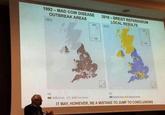



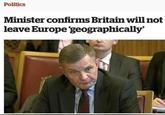


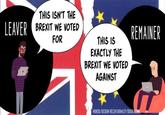












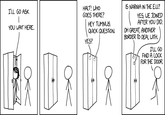

Top Comments
Snesokk
May 08, 2016 at 09:27AM EDT
Colin Mochrie
Jun 24, 2016 at 12:02AM EDT